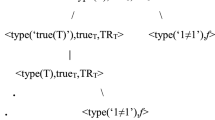Abstract
The property common to three kinds of paradoxes (logical, semantic, and cultural) is the underlying presence of an exclusive disjunction: even when it is put to a check by the paradox, it is still invoked at the level of implicit discourse. Hence the argumentative strength of paradoxical propositions is derived. Logical paradoxes (insolubilia) always involve two contradictory, mutually exclusive, truths. One truth is always perceived to the detriment of the other, in accordance with a succession which is endlessly repetitive. A check is put on the principle of the excluded middle by the logical paradoxes, because self-reference leads to an endlessly repeating circle, out of which no resolution is conceivable. Logical paradoxes are to be compared with the `objective ambiguity' prevalent in oracles (Gallet, 1990). Semantic paradoxes are contextually-determined occurrences, whose resolution at the metalinguistic level is made possible by the discovery of a middle term. They express a wilful ambiguity, in which the interlocutor is invited to take an active part in the construction of sense, since what must be found is the unexpected sense thanks to which A and not-A can be asserted simultaneously. Cultural paradoxes play about doxa (`common sense') and openly challenge common opinion because of their character as inopinata (`unexpected'). My aim is to show that even cultural paradoxes hide sometimes a flaw of argumentation similar to logical or semantic paradox; they too imply an exclusive disjunction leading to the disappearance of the middle terms. Finally, basing myself on the theory of topoi (Anscombre and Ducrot, 1983), a tentative resolution of the cultural paradoxes will be suggested.
Similar content being viewed by others
REFERENCES
Avezzù Tenuta, E.: 1977, Procedimenti paradossali e tecniche della persuasione in Tucidide, ‘L’Erma' di Bretschneider, Roma.
Boethius, S.: 1860, ‘De differentiis topicis’, in J. P. Migne (ed.), Patrologiae Cursus Completus, saSeries Latina 64, Paris, pp. 1039ff.
Bruxelles, S., O. Ducrot and P. Y. Raccah: 1995, ‘Argumentation and the Lexical Topical Fields’, Journal of Pragmatics 24, 99-114.
Burnyeat, M.: 1994, ‘Aristotle on the Logic of Persuasion’, in D. J. Furley and A. Nehamas (eds.), Aristotle's Rhetoric, Philosophical Essays, Princeton University Press, Princeton.
Carel, M. and O. Ducrot: 1999, ‘Le problème du paradoxe dans une sémantique argumentative’, Langue française 123, 6-26.
De Morgan, A.: 1970, Budget of Paradoxes, Open Court, La Salle.
Ducrot, O. and M. Carel: 1999, ‘Les propriétés linguistiques du paradoxe; paradoxe et négation’, Langue française 123, 27-40.
Falletta, N.: 1989, Il libro dei paradossi, trad. it. di Lucia e Massimo Parodi, Longanesi, Milano 1983, The Paradoxicon, Wiley, New York).
Gallet, B.: 1990, Recherches sur Kairos et l' ambiguïté dans la poésie de Pindare, Presses de l'A.N.R.T. Université de Lille III, Lille.
Garcea, A.: 2000, Gellio e la dialettica. Memorie dell'Accademia delle Scienze di Torino 24, 53-204.
Godart-Wendling, B.: 1990, La vérité et le menteur, Les pardoxes sui-falsificateurs et la sémantique des langues naturelles, Éditions du CNRS, Paris.
Green-Pedersen, N. J.: 1984, The Tradition of the Topics in the Middle Ages, Philosophia, München.
Kienpointner, M.: 1991, ‘Uses and Functions of Paradoxes in Natural Language’, ISSANewsletter 7, 2-16.
Kienpointner, M.: 2001, ‘Modern revivals of Aristotle's and Cicero's Topics: Toulmin, Perelman, Anscombre/Ducrot’, in A. Bertocchi, M. Maraldi and A. Orlandini (eds.), The Latin Argumentation, Papers on Grammar VII, CLUEB, Bologna, pp. 17-34.
Kim, S.: 1981, Inversions, Byte Books, Peterborough N.H.
Landheer, R.: 1996, ‘Le paradoxe: un mécanisme de bascule’, in Landheer R. and P. J. Smith (éds.), Le Paradoxe en Linguistique et en Littérature, Droz, Genève, pp. 76-91.
Lausberg, H.: 1969, Elementi di retorica, trad. it. di L. Ritter Santini, Il Mulino, Bologna 1967, Elemente der literarischen Rhetorik, Hueber, München).
Maraldi, M.: 1999, ‘Énoncés conditionnels, conditionnels concessifs et concessifs: le cas de etsi et de etiamsi’, in A. Bertocchi, M. Maraldi and A. Orlandini, L'argumentation en latin, Lalies 19, pp. 188-198.
Martin, R.: 1983, Pour une logique du sens, Presses Universitaires de France, Paris.
Moeschler, J. A. Reboul: 1994, Dictionnaire encyclopédique de pragmatique, Seuil, Paris.
Molager, J.: 1971, Cicero, Paradoxa Stoicorum, Les Belles Lettres, Paris.
Moretti, G.: 1990, Acutum dicendi genus. Brevità, oscurità, sottigliezze e paradossi nelle tradizioni retoriche degli Stoici, Dip. di Scienze Filologiche e Storiche, Trento.
Orlandini, A.: 1999, ‘Fr]Tamen: l'argumentation par “re-formulation rectifiante”’, in A. Bertocchi, M. Maraldi and A. Orlandini, L'argumentation en latin, Lalies 19, pp. 199-213.
Orlandini, A.: 2001a, ‘Paradoxes sémantiques et argumentation’, in Bertocchi A., M. Maraldi and A. Orlandini (éds.), Argumentation and Latin, Papers on Grammar VII, CLUEB, Bologna, pp. 133-146.
Orlandini A.: 2001b, Négation et argumentation en latin, Grammaire Fondamentale du Latin, Tome VIII, Bibliothèque d'Études Classiques, Peeters, Louvain-Paris.
Quine, W. V. O.: 1966, The Ways of Paradox and Other Essays, Random House, New York, trad. it. 1975, I modi del paradosso,Il Saggiatore, Milano.
Riposati, B.: 1947, Studi sui Topica di Cicerone, Società Editrice ‘Vita e pensiero’, Milano.
Russell, B.: 1903, The Principles of Mathematics, London, Allen &; Unwin.
Sainsbury, R. M.:19952, Paradoxes, Cambridge University Press, Cambridge.
Author information
Authors and Affiliations
Rights and permissions
About this article
Cite this article
Orlandini, A. Logical, Semantic and Cultural Paradoxes. Argumentation 17, 65–86 (2003). https://doi.org/10.1023/A:1022999824902
Issue Date:
DOI: https://doi.org/10.1023/A:1022999824902




